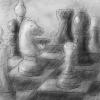I'd say it is kind-of a mix between nostalgia and the dreams, hopes and imaginations of the people actually living in the 19th century (found in books of the time), re-imagined by people living today.
This is the romantic period, and magic and superstition had a revival, mixed with lots of scientific breakthroughs, and the average person starting to feel the change brought about by industrialism. "Scientists" travelled the land putting up magic shows for an audience. The real power was had behind closed doors in smoky lounges where only the elite had access.
Vampires, demons, secret societies and mad scientists fit perfectly into this period.
"Frankenstein; or, The Modern Prometheus" was written 1818 after all...
(OT: I think it is a bit fun that the word "modern" has been in use for over 400 years now...)
And Bram Stoker's Dracula was written 1897. (and several other well known vampire books before that)
Jules Verne is a good example too.









